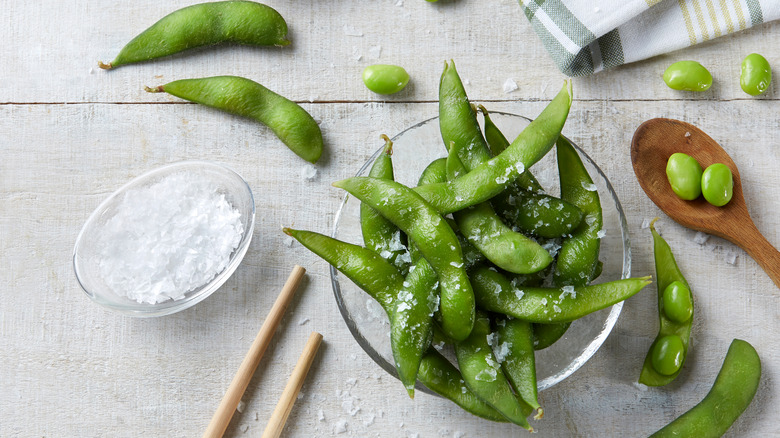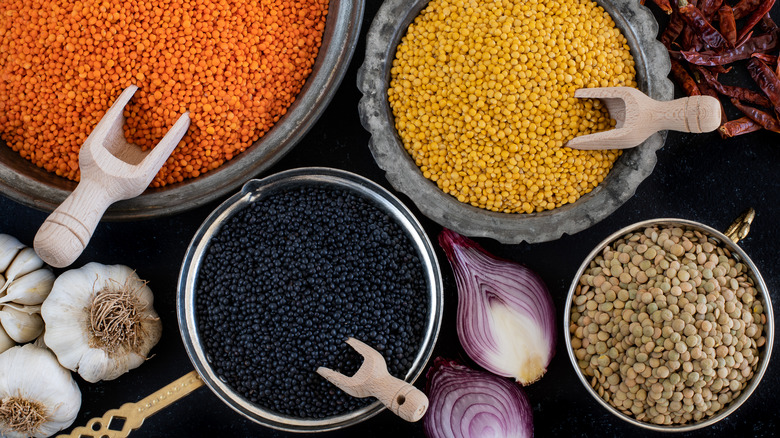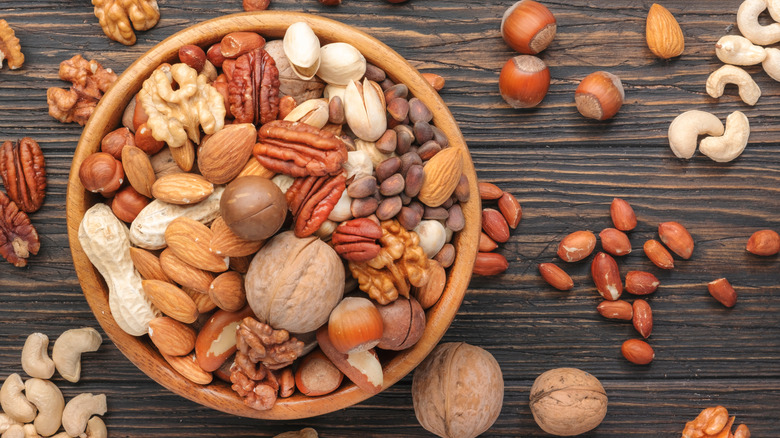3 Sources Of Vegan Protein To Include In Your Diet Today, According To A Lifestyle Medicine Physician
About 7% of people aged 20-29 in the United States follow a vegetarian diet (via Statista). Although some people worry about getting enough protein, with the right guidance, it's possible to accomplish. To help with that guidance, we tapped the shoulder of Dr. Simran Malhotra, a triple board-certified physician in internal medicine, hospice & palliative care, and certified health and wellness coach, to get the scoop. She says there are plenty of plant-based protein sources available and tells us that some plant-based proteins can be great for our health, even if we're not vegetarian or vegan.
"One of the greatest benefits for swapping plant-based proteins for animal-based proteins is the added health benefits," Dr. Malhotra said. "Plant-based proteins are rich in antioxidants, vitamins, minerals, lower in saturated fat and higher in fiber than animal-based proteins, which can help to reduce your risk of obesity, heart disease, diabetes, and other chronic conditions."
Dr. Malhotra says that protein might become a problem if we adopt a vegan "junk food diet" consisting of processed chips, fries, and baked goods. "I believe that getting enough protein on a vegan diet should not be something to worry about. As long as you focus on eating a balanced and diversified, whole food, plant-based diet, you can easily get the protein you need to stay healthy and energized," Dr. Malhotra said. Here are some protein sources she suggests.
Soybeans
Dr. Malhotra notes that people who live in "Blue Zones," where people consistently live to 100, typically incorporate beans into their diet. She says that soybeans are her favorite for their fiber, B vitamins, and minerals. If you've ever eaten cooked edamame, you easily got 8 grams of fiber and 18 grams of protein, she explains.
"Contrary to popular belief, whole soy foods are actually not harmful to our health," Dr. Malhotra said. "There is an abundance of research showing a wide array of benefits of eating whole food soy such as reducing the risk of breast cancer (and recurrence of breast cancer), reduction in hot flashes for women in menopause and lowering blood cholesterol."
Dr. Malhotra says soy-based foods are great alternatives to red and processed meats. She suggests finding minimally processed soy foods such as whole soybeans, tempeh, edamame, tofu, miso, or unsweetened soy milk. "I would recommend limiting or avoiding ultra-processed forms of soy such as soybean oil, soy protein supplements, or soy protein isolate (often found in frozen vegan or plant-based alternatives)," Dr. Malhotra said. "If you are transitioning towards a more whole food plant-based diet, then vegan alternatives are good transition foods to begin with if needed."
Lentils
Dr. Malhotra also recommends lentils because of their availability and affordability. Lentils are also nutritious with 18 grams of protein and 15 grams of fiber, and they are versatile for people just starting a plant-based diet. She adds, "The reason I love lentils is that they are easy to incorporate into dishes without even knowing they are there, which can be an added bonus if you are trying to feed a picky child!" Dr. Malhotra suggests adding lentils to chili, soups, dips, and pasta.
If you're new to a plant-based diet, Dr. Malhotra says eating beans might be tough for the body to adjust to at first. "Legumes such as beans and lentils can be difficult to digest for some people in the beginning, simply because their gut bacteria isn't used to this food," Dr. Malhotra said. She suggests incorporating these foods slowly into the diet and adding ginger, fennel, or asafetida to aid in the digestive process.
Nuts and seeds
Dr. Malhotra suggests nuts and seeds as good vegan protein sources because they also add potassium, fiber, antioxidants, and healthy fats. Healthy fats will help you feel fuller for longer and help you feel satisfied after a meal. Her favorites are almonds, cashews, walnuts, flaxseeds, hemp seeds, and chia seeds. "Nuts & seeds are so versatile in that you can eat them on their own as a snack, add them to smoothies or salads, savory sauces or baked goods such as granola bars or breads," she said.
Nuts and seeds also have great health benefits. "Nuts and seeds are a longevity food that has been associated with reduced risk of diseases such as cardiovascular disease and cancer," Dr. Malhotra said. Although many nuts are high in calories, they can help you lose weight because your body doesn't absorb all of the calories, according to Healthline.
Dr. Simran Malhotra is a diplomate of the American College of Lifestyle Medicine (ACLM). She completed the T.Colin Campbell Plant-based nutrition certification and the CHEF culinary coaching certification. She's the founder of Coach Simran, M.D., a platform where she works with and educates women at high risk for cancer. You can also find her on her blog, Instagram, Facebook, and LinkedIn.




